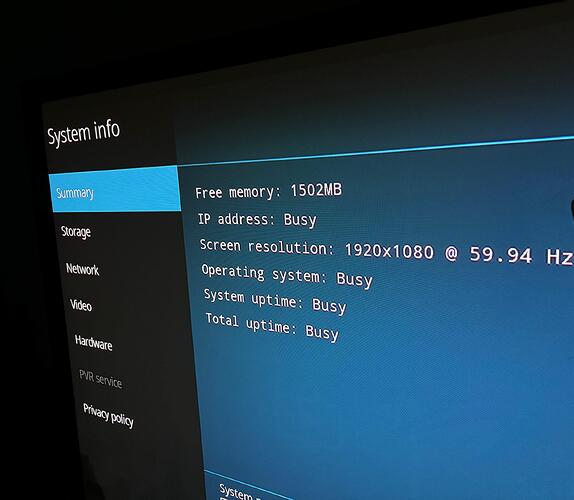I’ve replaced the HDMI cable but seem to be getting the same edid error. Here’s the logs:
https://paste.osmc.tv/gidanoyize
It seems to be running better with standard Blu-rays. I’m able to skip throughout the movie without any or much delay. No blue circle when I initiate playing a Blu-Ray.
However, when I play a 4k (in this case, “Ambulance”), there’s a delay with the blue circle at the beginning. Skipping through the show by say 30 seconds can cause longer delays. And in this case, the last time I skipped on “Ambulance”, it simply reset to the beginning of the movie (yet it still froze the screen on the time when I attempted to skip). The time kept running from 0:00:00 but the movie remained frozen.
As mentioned earlier, the 4k played fine prior to the need to reinstall. So even with ethernet speed of 100mbs, it worked fine.
I’ll paste the Iperf3 data below. 192.168.1.15 is the server. 192.168.1.3 is the client. The first time is with the -R and the second time is without the -R:
Test #1 With “-R”:
data from client 192.168.1.3:
osmc@osmc:~$ iperf3 -R -c 192.168.1.15
Connecting to host 192.168.1.15, port 5201
Reverse mode, remote host 192.168.1.15 is sending
[ 5] local 192.168.1.3 port 39796 connected to 192.168.1.15 port 5201
[ ID] Interval Transfer Bitrate
[ 5] 0.00-1.00 sec 10.6 MBytes 88.7 Mbits/sec
[ 5] 1.00-2.00 sec 10.6 MBytes 88.7 Mbits/sec
[ 5] 2.00-3.00 sec 10.5 MBytes 88.4 Mbits/sec
[ 5] 3.00-4.00 sec 10.5 MBytes 88.2 Mbits/sec
[ 5] 4.00-5.01 sec 10.7 MBytes 88.6 Mbits/sec
[ 5] 5.01-6.00 sec 10.8 MBytes 91.0 Mbits/sec
[ 5] 6.00-7.00 sec 11.2 MBytes 94.1 Mbits/sec
[ 5] 7.00-8.00 sec 11.2 MBytes 94.2 Mbits/sec
[ 5] 8.00-9.00 sec 11.2 MBytes 94.2 Mbits/sec
[ 5] 9.00-10.00 sec 11.2 MBytes 93.7 Mbits/sec
[ ID] Interval Transfer Bitrate Retr
[ 5] 0.00-10.04 sec 109 MBytes 91.0 Mbits/sec 53 sender
[ 5] 0.00-10.00 sec 108 MBytes 91.0 Mbits/sec receiver
iperf Done.
Data from Server:
Server listening on 5201
Accepted connection from 192.168.1.3, port 39794
[ 5] local 192.168.1.15 port 5201 connected to 192.168.1.3 port 39796
[ ID] Interval Transfer Bitrate Retr Cwnd
[ 5] 0.00-1.00 sec 10.7 MBytes 89.7 Mbits/sec 4 77.8 KBytes
[ 5] 1.00-2.00 sec 10.6 MBytes 89.1 Mbits/sec 2 103 KBytes
[ 5] 2.00-3.00 sec 10.4 MBytes 87.1 Mbits/sec 7 93.3 KBytes
[ 5] 3.00-4.00 sec 10.6 MBytes 89.1 Mbits/sec 5 86.3 KBytes
[ 5] 4.00-5.00 sec 10.5 MBytes 88.1 Mbits/sec 7 76.4 KBytes
[ 5] 5.00-6.00 sec 10.9 MBytes 91.7 Mbits/sec 9 73.5 KBytes
[ 5] 6.00-7.00 sec 11.2 MBytes 93.8 Mbits/sec 3 72.1 KBytes
[ 5] 7.00-8.00 sec 11.2 MBytes 94.4 Mbits/sec 7 89.1 KBytes
[ 5] 8.00-9.00 sec 11.2 MBytes 94.4 Mbits/sec 4 91.9 KBytes
[ 5] 9.00-10.00 sec 11.2 MBytes 93.8 Mbits/sec 5 91.9 KBytes
[ 5] 10.00-10.04 sec 255 KBytes 52.2 Mbits/sec 0 91.9 KBytes
[ ID] Interval Transfer Bitrate Retr
[ 5] 0.00-10.04 sec 109 MBytes 91.0 Mbits/sec 53 sender
Server listening on 5201
Test #2 without “-R”
Client:
osmc@osmc:~$ iperf3 -c 192.168.1.15
Connecting to host 192.168.1.15, port 5201
[ 5] local 192.168.1.3 port 39802 connected to 192.168.1.15 port 5201
[ ID] Interval Transfer Bitrate Retr Cwnd
[ 5] 0.00-1.00 sec 11.8 MBytes 98.8 Mbits/sec 0 97.6 KBytes
[ 5] 1.00-2.00 sec 11.2 MBytes 93.8 Mbits/sec 0 102 KBytes
[ 5] 2.00-3.00 sec 11.3 MBytes 94.9 Mbits/sec 0 105 KBytes
[ 5] 3.00-4.00 sec 11.2 MBytes 93.8 Mbits/sec 0 105 KBytes
[ 5] 4.00-5.00 sec 11.2 MBytes 93.8 Mbits/sec 0 110 KBytes
[ 5] 5.00-6.00 sec 11.2 MBytes 93.8 Mbits/sec 0 110 KBytes
[ 5] 6.00-7.00 sec 11.2 MBytes 93.8 Mbits/sec 0 110 KBytes
[ 5] 7.00-8.00 sec 11.2 MBytes 93.8 Mbits/sec 0 110 KBytes
[ 5] 8.00-9.00 sec 11.4 MBytes 95.9 Mbits/sec 0 110 KBytes
[ 5] 9.00-10.00 sec 11.2 MBytes 94.4 Mbits/sec 0 161 KBytes
[ ID] Interval Transfer Bitrate Retr
[ 5] 0.00-10.00 sec 113 MBytes 94.7 Mbits/sec 0 sender
[ 5] 0.00-10.04 sec 112 MBytes 93.8 Mbits/sec receiver
Server:
Accepted connection from 192.168.1.3, port 39800
[ 5] local 192.168.1.15 port 5201 connected to 192.168.1.3 port 39802
[ ID] Interval Transfer Bitrate
[ 5] 0.00-1.00 sec 10.8 MBytes 90.8 Mbits/sec
[ 5] 1.00-2.00 sec 11.2 MBytes 94.2 Mbits/sec
[ 5] 2.00-3.00 sec 11.2 MBytes 94.1 Mbits/sec
[ 5] 3.00-4.00 sec 11.2 MBytes 94.1 Mbits/sec
[ 5] 4.00-5.00 sec 11.2 MBytes 94.1 Mbits/sec
[ 5] 5.00-6.00 sec 11.2 MBytes 94.1 Mbits/sec
[ 5] 6.00-7.00 sec 11.2 MBytes 94.1 Mbits/sec
[ 5] 7.00-8.00 sec 11.2 MBytes 94.2 Mbits/sec
[ 5] 8.00-9.00 sec 11.2 MBytes 94.1 Mbits/sec
[ 5] 9.00-10.00 sec 11.2 MBytes 94.1 Mbits/sec
[ 5] 10.00-10.04 sec 424 KBytes 93.1 Mbits/sec
[ ID] Interval Transfer Bitrate
[ 5] 0.00-10.04 sec 112 MBytes 93.8 Mbits/sec receiver
Server listening on 5201
Let me know if you need anything else to help diagnose the problem. Thank you for your time.
